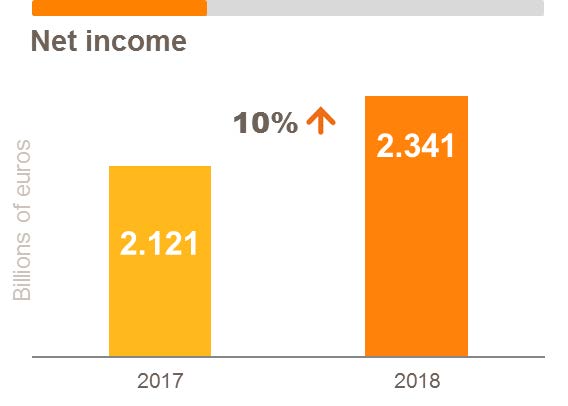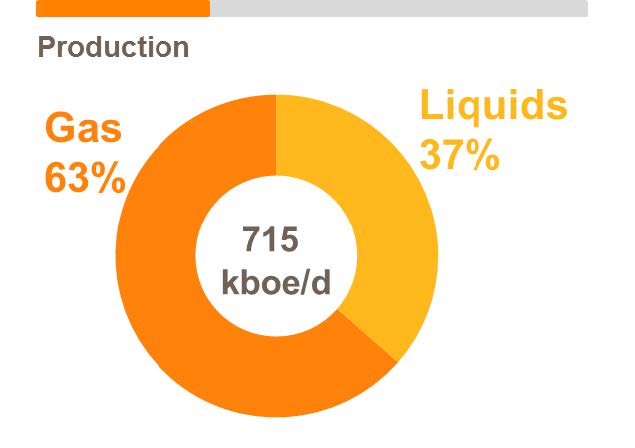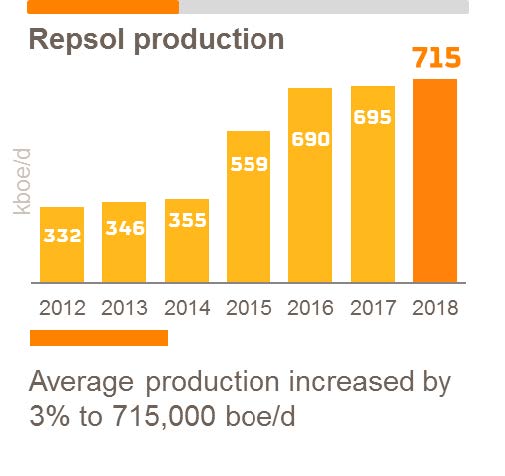Repsols net income reaches 2.341 billion, the highest in 8 years
- Net income increased 10% from the previous year to 2.341 billion euros, the highest in the last eight years..
- Adjusted net income, which specifically measures the performance of the company’s businesses, grew 10% to 2.352 billion euros. EBITDA rose to 7.513 billion euros, a 12% increase.
- The earnings reflect the strength of the company’s businesses as well as its flexibility, adaptability and preparedness for any scenario. During this period, Repsol increased value-generation and enhanced its position as a multi-energy provider.
- The Upstream unit (Exploration and Production) doubled its 2017 earnings to reach 1.325 billion euros, bolstered by implemented efficiency measures, higher volumes and the relative improvement in international prices.
- Hydrocarbon production (gas and oil) increased by 3% to 715,000 barrels of oil equivalent per day. This growth was supported by the start-up of projects in Algeria, Trinidad and Tobago, the United Kingdom, Peru and Malaysia, as well as the connection of new wells in Marcellus (United States) and the acquisition of Visund in Norway.
- The Downstream unit’s earnings (Refining, Chemicals, Marketing, Lubricants, LPG, Trading & Gas and Repsol Electricidad y Gas) totaled 1.583 billion euros, with improved performance in Marketing, LPG and Trading & Gas. The refining margin was in line with that of last year, and is among the best in Europe.
- The company updated its strategy last June after meeting the objectives of the 2016-2020 Strategic Plan two years ahead of schedule. The update is based on three pillars: an increase in shareholder compensation, profitable growth in the Upstream and Downstream units, and the development of new businesses connected to the energy transition
- Significant steps were taken during the year to consolidate the low-emissions businesses, supporting Repsol’s commitment to becoming a leading global multi-energy provider.
- In November, Repsol completed the purchase of Viesgo’s non-regulated, low-emissions electricity generation assets as well as its distributor, to become a relevant player in the Spanish generation market, with a total installed capacity of 2,952 MW and plans for a further 289 MW.
- Repsol is implementing a digitalization program throughout the company, which will generate one billion euros in 2022 from new revenue and the optimization of investments and expenses.
- During the period, net debt fell 45% to 3.439 billion euros.
Repsol posted net income of 2.341 billion euros in 2018, a 10% increase from the 2.121 billion earned in 2017 and the highest in eight years. This was achieved with average Brent oil prices at 71 dollars per barrel last year, compared with more than 111 dollars in 2011.
Adjusted net income, which specifically measures the progress of Repsol’s businesses, also increased 10% to 2.352 billion euros, exceeding the 2.131 billion recorded in the previous year.
In addition to the strength of its businesses, these results reflect Repsol’s adaptability and innovation—particularly following the implementation of the efficiency program in recent years—as well as its flexibility to incorporate and develop new capabilities. All of this has allowed the company to increase value generation while simultaneously playing a more active role as a multi-energy provider.
The company’s integrated business model allowed it to take full advantage of improved oil prices - Brent was 32% higher than in 2017 – although they remained far from their historic highs. In contrast, the Henry Hub gas benchmark averaged a price similar to last year.
In this context, the Upstream unit doubled its earnings to 1.325 billion euros, continuing the positive trend of previous years. The increase in production and rising oil prices were integral to this positive performance, as were the efficiency measures and digitalization programs, which continue to demonstrate their effectiveness.
The Downstream unit earned 1.583 billion euros, with improved performance from the commercial businesses, Marketing and LPG (liquefied petroleum gas), and positive results from Trading & Gas. The Chemicals unit was affected by a worsening international environment, maintenance shutdowns at some industrial facilities, which also affected refining, and the weakness of the dollar against the euro.
The company’s EBITDA increased to 7.513 billion euros, 12% higher than the 6.723 billion in the previous year.
The Group’s positive business performance, along with the sale of its stake in Naturgy Energy Group, led to a 45% fall in net debt to 3.439 billion euros, compared with the 6.267 billion at the end of 2017. Meanwhile, liquidity rose to 8.742 billion euros by late December.
Repsol updated its 2020 strategy last June, after meeting the objectives of the 2016-2020 Strategic Plan two years ahead of schedule. This update is based on three pillars: increasing shareholder compensation, fostering profitable growth in the Upstream and Downstream units, and developing new businesses connected to the energy transition.
In that respect, Repsol reached an agreement in June 2018 to purchase Viesgo’s non-regulated, low-emissions electricity generation businesses and its gas and electricity distributor, including 750,000 customers. With this acquisition, which was completed on November 2nd, Repsol strengthened its position as a multi-energy operator, achieving a total installed capacity of 2,952 MW (2,352 MW from this transaction and 600 MW from its existing cogeneration plants).
In the third quarter, the company also acquired the Valdesolar photovoltaic project planned in the Valdecaballeros (Badajoz, Spain), which is in the administrative permitting phase. The project will have an installed generation capacity of 264 MW. With these additions, Repsol will have achieved more than 70% of its strategic objective for a low-emissions generation capacity of 4,500 MW by 2025.
In October, the company also secured financing for the construction of one of the largest floating offshore wind farms in the world, located off the coast of Portugal with an installed capacity of 25 MW.
During the year, Repsol raised shareholder compensation to 0.9 euros/share, an increase of 15%. Additionally, it achieved a reduction in share capital through the cancellation of own shares by an amount equivalent to the shares issued in 2018 through the scrip dividends, resulting in increased earnings per share.
The company plans to raise the dividend to one euro per share in 2020, with a total repurchase of the shares issued in the Repsol Flexible Dividend program. All of this positions its shareholder compensation among the highest in the sector.
Repsol’s positive performance was reflected in the company’s improved credit rating. In October, Fitch upgraded the outlook for Repsol to “positive” with a long-term credit rating of BBB. In early December, Moody’s announced a rating upgrade to Baa1 with a “stable” outlook, and a few days later S&P Global Ratings upgraded its outlook to “positive” and confirmed the long-term credit rating of BBB.
Repsol continued to advance its digitalization program, which is being implemented throughout the organization and will increase cash flow by one billion euros in 2022, both through new income and the optimization of investments and expenses. It will also offer higher-safety processes, contribute to emissions reduction and promote circular economy initiatives.

The Upstream unit’s adjusted net income reached 1.325 billion euros, an increase of 110% over the 632 million earned in 2017.
The company’s portfolio management and the implementation of efficiency and digitalization programs boosted the unit’s earnings. An increase of 3% in production and improved realization prices were integral to this positive performance.
In terms of international benchmarks for raw materials, Brent oil increased its average price by 32% compared to the previous year, with an average annual price of 71 dollars per barrel. It reached a high of 86 dollars per barrel in October, but decreased significantly through the end of the year, falling to around 50 dollars per barrel. Henry Hub maintained an average of 3.1 dollars per million Btu, similar to the 2017 price.
Repsol’s output reached an average of 715,000 barrels of oil equivalent per day (boe/d), a 3% increase over the previous year. Gas represented 63% of production, and liquids the remaining 37%.
This increase was largely made possible by the start-up of projects including Reggane (Algeria), Juniper and TROC (Trinidad and Tobago), Monarb (United Kingdom), Kinabalu and Bunga Pakma (Malaysia) and Sagari (Peru), as well as the acquisition of the Visund field (Norway), the connection of new wells in Marcellus (United States) and an increased contribution from Libya.
These were complemented by the development of projects throughout the year that provide significant value and guarantee the sustained growth of the Upstream unit. In Brazil, the company obtained the declaration of commerciality for the Entorno de Sapinhoá, which borders the highly productive Sapinhoá block in the country’s prolific pre-salt region.
In Bolivia, the contract for the exploration and production of hydrocarbons in the Iñiguazú field was approved. This field is adjacent to the Caipipendi area, where Repsol already operates the Margarita-Huacaya field—the largest in Bolivia, producing 19 million cubic meters of gas per day.

In Norway, the company acquired in 2018 7.7% of the Visund field and at the beginning of 2019 obtained a 7.65% stake in the Mikkel field. These transactions have allowed Repsol to increase production levels in the country by 45% to 32,000 barrels of oil equivalent per day. In March of last year, the Yme field redevelopment project was approved, and in August the Gudrun field consortium—which includes Repsol—announced the discovery of gas and oil.
In 2018, Repsol began development of the Buckskin project in the Gulf of Mexico (United States), with production projected to begin in the second half of this year.
The company installed the Angelin platform in Trinidad and Tobago, which began producing gas at the end of February of 2019. Two new offshore gas projects were also authorized in the country: Cassia and Matapal. Additionally, the company approved the first stage of development of Akacias in Colombia’s CPO-9 block. It was also granted new exploration licenses in Mexico, Brazil, Norway, Greece, Indonesia, Bulgaria and the United States—specifically in the state of Alaska, where Repsol has made significant hydrocarbon discoveries
Upstream investments increased to 1.973 billion euros during the year, of which 70% was allocated to project development and 21% to exploration.

The Downstream unit posted an adjusted net income of 1.583 billion euros in 2018, compared with 1.877 billion in the previous year.
The Refining and Chemicals units were affected throughout the year by a worsening international environment and the weakness of the dollar against the euro. They were also influenced by shutdowns for maintenance and improvements at the Puertollano (Spain), Tarragona (Spain) and Sines (Portugal) industrial complexes. These improvements enabled Repsol to remain among the industry leaders in Europe, thanks to gains in efficiency, productivity and innovation.
The refining margin indicator was 6.7 dollars per barrel, similar to its 2017 value of 6.8 dollars per barrel. A significant development in refining was the inauguration of new gasoline desulfurization units at the La Pampilla refinery (Peru) in November. These units, in which 741 million dollars have been invested, will allow Repsol to produce more environmentally- sustainable and higher-quality products.
The Trading & Gas unit increased its earnings in comparison to 2017, as did the LPG unit, driven by higher sales in the Spanish market.
The Marketing unit also improved its performance, with higher earnings in Direct Sales and Aviation. During 2018, the company continued working to bring new value to its customers and to offer products and services that meet their needs. To this end, it strengthened its partnerships with prestigious companies such as El Corte Inglés, with which it is developing an expansion plan to open 1,000 Supercor Stop & Go stores at Repsol service stations in the next three years.
This project complements Repsol’s 70% share in the Kiklin digital platform, through which the company is developing its Waylet mobile app: a universal payment app that has more than a million registered users. In addition to Repsol’s network of service stations, the app can be used at many other points of sale, thanks to 2,400 signed agreements.
Repsol also launched its new car-sharing service, WiBLE, in partnership with Kia. The service began operating in Madrid in July with 500 vehicles and has already reached 70,000 customers to date.
Furthermore, in accordance with its commitment to gas as an essential resource for the energy transition, Repsol signed an agreement with Venture Global LNG for the supply of one million metric tons per year of LNG (liquefied natural gas) for 20 years.
In March, the company launched a project in Mexico through which it aims to achieve an 8-10% share in the Mexican service station market within the next five years. Repsol has already opened more than 180 service stations in the country and has signed contracts to reach 240. It has also agreed to participate in three infrastructural projects, which will add more than 750,000 barrels of total storage capacity.
Also in Mexico, Repsol began producing lubricants locally through an agreement with Mexican company Bardahl. This, the largest transaction ever carried out by the company in this unit, is a key milestone to continue with the internationalization of the business, aiming to double sales volume to 300,000 metric tons in 2021, of which 70% will be outside Spain.
Repsol also acquired the Puma Energy service stations in Peru, an operation that increased sales volume in the country by 10%.
The company invested 1.831 billion euros in the Downstream unit in 2018, compared to 805 million euros in 2017. This significant increase was driven by a commitment to new businesses, innovation and expansion of the unit.